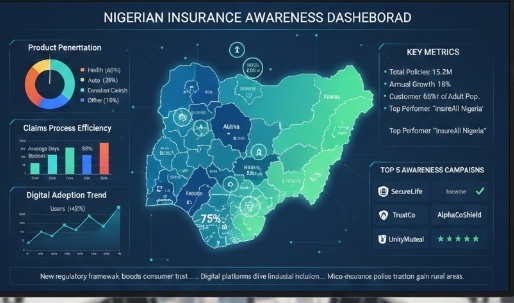Combating insurance fraud: A continuing challenge

Kindly leave a comment and share
Fraud has plagued the insurance industry globally since its inception, undermining trust and stability. In Nigeria, the insurance industry faced significant challenges in the late 1990s and early 2000s due to economic decline, which also saw a rise in fraudulent insurance claims.
Despite efforts to revitalize the industry, insurance fraud remains a pressing concern, necessitating innovative solutions and collaborative approaches to protect policyholders and ensure the integrity of the insurance system.
In 2007, the National Insurance Commission (NAICOM) initiated a recapitalisation exercise to revitalize Nigeria’s insurance industry. This effort led to a thorough examination of insurance companies’ financial health, uncovering numerous cases of fraud, mismanagement, and non-compliance, which in turn resulted in the merger and liquidation of several undercapitalised or insolvent firms. Although the exercise achieved significant reforms, it did not eradicate fraud entirely.
The rapid evolution of technology and the internet has revolutionized various industries, including insurance. Over the past decade, the sector has undergone significant digital transformation, enhancing efficiency, customer experience, and data-driven decision-making. However, this digital shift has also enabled insurance fraudsters to adapt and innovate, exploiting new vulnerabilities and tactics to deceive insurers and policyholders.
Modern Challenges in Insurance
Traditionally, insurance fraud involved fake claims and staged incidents. However, with technological advancements and AI, insurers now face sophisticated threats from organised fraudsters, including phishing, identity theft, and deep fakes.
Common Forms of Insurance Fraud in Nigeria:
Unlicensed Insurance Agents
Unlicensed or unauthorized insurance agents pose as legitimate insurance professionals, selling fake or non-existent insurance policies to unsuspecting individuals. These fraudsters often use social media, online ads, or word-of-mouth to target potential customers, leaving policyholders vulnerable.
Insurance Identity Fraud
In Nigeria, identity theft and impersonation are common tactics used by insurance fraudsters to file false claims. These individuals steal personal information, often obtained through data breaches or other illicit means, to create fake insurance accounts or assume someone’s identity. With stolen identities, they file claims, attempting to deceive insurers into providing payouts. This type of fraud not only results in financial losses but also compromises the integrity of the insurance system.
Premium Theft by Insurance Agents
Some insurance agents exploit unsuspecting customers by manually collecting premiums, bypassing official digital payment channels, and failing to remit payments to the insurer. This deceitful practice often targets vulnerable individuals, who may only discover the fraud when filing a legitimate claim, only to find their policy is inactive despite having made payments to the agent.
Exploiting the Claims Process
Motor and health insurance policies are among the most widely adopted globally, resulting in a high volume of claims. Insurers strive to provide a seamless and efficient claims experience. However, some policyholders take advantage of this by inflating or falsifying claims, attempting to secure undeserved payouts. This fraudulent activity can drive up costs and undermine the integrity of the insurance system.
Securing the Digital Insurance Landscape
The digitization of insurance has undoubtedly transformed the industry, making it more accessible and customer-friendly. With online platforms and mobile apps, customers can now easily research, purchase, and manage their insurance policies. This increased convenience has expanded the reach of insurance products, enabling more people to protect themselves and their assets. Additionally, digitisation has improved operational efficiency and enhanced customer experience, but it has also introduced new risks, as the ease of online transactions and anonymity of digital interactions create opportunities for fraudsters to exploit vulnerabilities in the system.
However, this digitisation has also introduced new risks. The ease of online transactions and the anonymity of digital interactions have created opportunities for fraudsters to exploit vulnerabilities in the system. As a result, insurers face the daunting task of safeguarding their platforms against fraudulent activities while maintaining a seamless experience for legitimate customers.
To effectively combat insurance fraud, insurers must harness the power of advanced technologies, such as data analytics, to identify suspicious patterns and anomalies.
By leveraging these tools, insurers can detect and prevent fraud more efficiently, minimizing losses and protecting their customers. Striking the right balance between security and customer experience is crucial, as overly stringent measures can drive customers away.
Insurers who successfully navigate this challenge will be better equipped to build trust, maintain customer loyalty, and thrive in a competitive market.
Leveraging Technology to Combat Insurance Fraud
The insurance industry globally is continually harnessing innovative technologies to detect and prevent fraudulent activities, enhancing its defenses against evolving threats.
Some key advancements include:Artificial Intelligence (AI) in Claims Analysis AI-powered systems analyse historical claims data to identify patterns and anomalies, enabling insurers to predict and prevent fraudulent claims. By integrating AI into their underwriting and claims processes, insurers can enhance their risk assessment capabilities and reduce losses.
Behavioural Analytics in Policyholder Profiling
By tracking policyholder behaviour, insurers can identify suspicious patterns and anomalies that may indicate potential fraud. This proactive approach enables insurers to flag high-risk claims for further investigation.
Blockchain and Biometric Authentication
Blockchain technology ensures the secure storage and management of sensitive policyholder information, while biometric authentication methods, such as fingerprint scanning and facial recognition, provide an additional layer of security to prevent identity theft and impersonation.
By embracing these technological innovations, insurers can strengthen their defenses against insurance fraud, reduce claims leakage, and improve overall operational efficiency.
Coronation Insurance’s Multifaceted Approach to Combating Insurance Fraud
Coronation Insurance prioritizes protecting its customers and ecosystem from the scourge of insurance fraud. To achieve this, the company has implemented a comprehensive strategy that encompasses:
Education and Awareness
Regular educational content series are circulated via emails, webinars, and social media to enlighten employees and customers on the risks associated with insurance fraud and cybersecurity threats, including phishing attacks, identity theft, and hacking.
Advanced Technology
Coronation Insurance leverages cutting-edge AI-powered Optical Character Recognition (OCR) technology to swiftly detect potential fraud, particularly in motor insurance claims. This technology enables the company to efficiently analyze vast amounts of data and identify suspicious patterns.
Asset Recovery
The company utilizes advanced AI trackers to pinpoint the location of stolen vehicles and mobile devices, thereby increasing the chances of recovery and reducing losses.
Expertise and Collaboration
Coronation Insurance’s team of seasoned claims and IT professionals work in tandem to identify and mitigate potential threats. Their expertise and knowledge enable the company to stay one step ahead of fraudsters and protect its customers’ interests.
By continually refining its technology and strategies, Coronation Insurance aims to create a secure and trustworthy environment for its customers, where they can confidently purchase and manage their insurance policies.
Achieving a Fraud-Resilient Insurance Ecosystem
The goal of reducing insurance fraud rates requires a collaborative effort between insurers, regulators, and policymakers. By working together, these stakeholders can develop and implement effective strategies to prevent and detect fraud, ultimately creating a more secure environment for policyholders. This synergy is crucial in fostering a culture of transparency, accountability, and innovation, which can help drive down fraud rates and promote trust in the insurance industry.
By ensuring transparency in data usage and protection, and educating customers on these measures, insurers can foster trust and cooperation, ultimately reducing the prevalence of fraud and creating a more secure environment for policyholders.
To read more articles from Coronation Insurance Plc, please visit https://coronation.ng/insights/For more information, connect with us at contactcentre@coronationinsurance.com.ng call 02-012774500 | 02-012774566 | 02-012774577.






